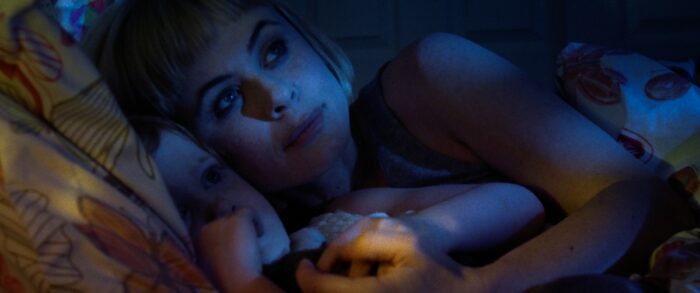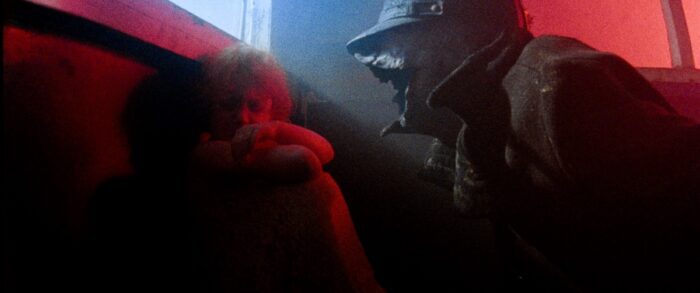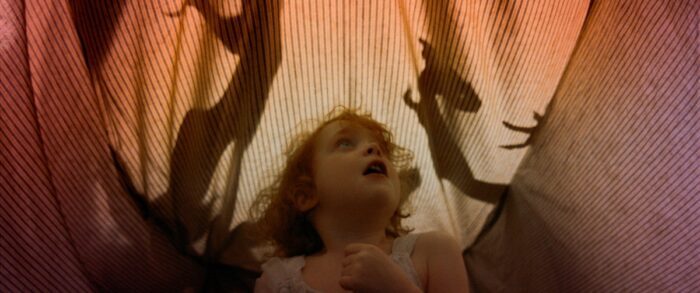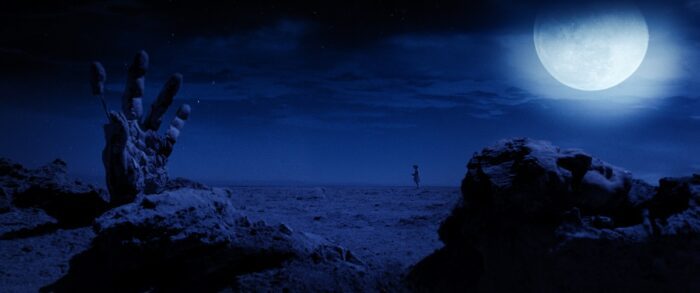EDITOR’S NOTE: This piece was written during the 2023 WGA and SAG-AFTRA strikes. Without the labor of the writers and actors currently on strike, films like Moon Garden might not exist.
Even in times when the future of cinema seems destined to collapse upon itself into the flotsam of infinite franchise-fare sequels, remakes, and reboots, new auteurs continue to break through with incredible, visionary work that signals real promise for the art form. With his directorial debut Moon Garden, Mark Stevens Harris—also the film’s writer, editor, sound designer, and animator—looks to cinema’s rich past to create a work of art that feels stunningly, remarkably, absolutely new and fresh. With a pitch-perfect performance from its lead child actor and an unearthly garden of inspired visual delights, Harris’ film is a wild and traumatic journey through the mind of a coma-ridden child.
Only child Emma (Haven Lee Harris), wide-eyed and cherubic, is witness to her parents’ crumbling marriage: dad Alex (Brionne Davis) is a harried novelist struggling with writer’s block and anger issues; mom Sara (Augie Duke) suffers from a depression that has her longing for a lost youth. Their love for Emma seems the only bond in their marriage, but it’s not enough. When Emma witnesses a terrible fight between them, she flees the violent scene and falls, landing unconscious.

From there, Emma wakes in a surreal dark forest, where through a portal she she sees a stark reality: her parents crying as EMTs cart her unconscious body in an ambulance. “I’m here!” she cries, to no avail, as a nightmarish figure rises, tucking a set of chattering teeth into his gaping maw. He’s the first—and the most threatening—of several figures she will encounter on her fantastical journey through her mind. Frightened, Emma flees, only to meet a bow-tied music box musician who gives her an old transistor radio, a talisman that plays her mother’s soothing voice.

Finding some solace in the comfort of her mother’s voice, Emma follows the radio signal deeper and deeper into the surreal dreamscape, hoping it will lead her back home. Along the way, she encounters several more curious creatures as the landscape transforms: her favorite stuffed toy is now a mountainous rhinoceros, her father’s novel a dark fairy tale narrated by a headless mannequin, her mother’s mediated voice all the while a distant beacon.
It’s a Wizard of Oz story, made out of the Hero’s Journey template: the hero leaves or is dispatched from home on a journey to a new world, where they encounter villains and helpers before they must secure the object that will help them meet an arduous physical challenge and return home, changed and for the better. As fantastical and bizarre as Victor Fleming’s 1939 imagery was, Moon Garden creates an enthralling dreamscape where Emma’s anxieties play out in an unearthly array of stop-motion, practical visual effects, clever puppetry, simple props, forced perspectives, miniatures, and set designs that are nothing short of magical. There is no CGI, and the filmmakers used old Arri 35mm cameras with expired film stock, retrofit to shoot in HD, to achieve the distinct look.

While Emma’s journey through her own mind, her quest to return to her parents, drives the narrative, each set piece along the way makes for its own uniquely enchanting creation. The “Teeth” character’s domain is a filthy dungeon pocked with grime. A lovingly-lit, sparely-framed dining room is home to a spry-but-chaotic dance between lovers. A simple bedsheet fort casts frightening shadows. Most of these effects have existed since nearly the inception of cinema, and what I love about Moon Garden is its indebtedness to the magic of Georges Méliès, who took his characters to the moon in 1902, and the stop-motion cutouts of Lotte Reiniger, who brought Prince Achmed to life in 1926; director-writer Harris uses the cinema’s oldest techniques and most recognizable story structures to create a tale that feels wondrously, magically, ethereally new at each turn.

Yet Moon Garden is no mere exercise in visual conceits. Its message is pure and simple: that trauma can be survived, that there is hope for broken relationships, that familial love can triumph even over the greatest of adversities. It’s Harris’ own daughter who plays Emma: the director puts the actor through all kinds of trauma, but then again this too is simply the magic of narrative cinema in the reaction shot cut against the shot of the frightening image. Little Haven Lee Harris is pitch perfect in her tousle-haired, wide-eyed expressiveness, whether cowering in awe of the fearsome “Teeth” or jutting her jaw in determination to find her way back to her parents. Moon Garden is certainly too traumatic for a children of the actor’s age to watch, but hers is an excellent performance, everything one could ask of a child onscreen.
A labyrinthine journey through a traumatized child’s comatose-but-highly-imaginative mind, Moon Garden is a special film. Propelled by intense visuals calling to mind the surrealism of Guillermo del Toro’s Pan’s Labyrinth, the nightmarish landscapes of Phil Tippet’s Mad God, or the simplistic wizardry of Douglas Trumbull—all of them created with stunningly inventive practical effects that call back to cinema’s rich history—Ryan Steven Harris’ debut feature is a remarkable film and an absolute must watch, one anchored by a memorable performance by the director’s daughter as a child desperate to reconnect with her anxious, troubled parents.


![[L-R] Stephen King and Frank Darabont in the documentary film, KING ON SCREEN, a Dark Star Pictures release. Photo courtesy of Dark Star Pictures.](https://filmobsessive.com/wp-content/uploads/2023/08/KingonScreen_9-200x100.jpg)


Best movie of the year